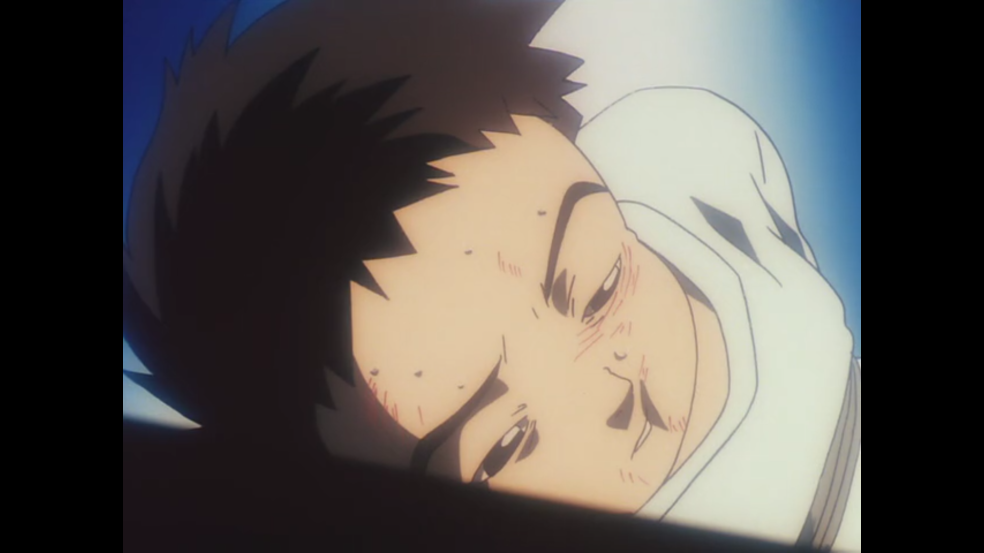Now and Then, Here and There is a really good show. As someone who wants to get good at writing, I’m always looking for new shows to show me how it’s done. Now and Then is a series that definitely showed me how it’s done. The show managed to tell a complete story in 13 episodes with impressive consistency. It’s a show that I’ll have to revisit on another day, because I have so many thoughts on it. This review won’t do it justice, so I’ll likely come back to it another day. For now, this is all I have.

The story follows a young boy named Shu, who is transported 10 billion years into the future. This earth is on its last legs, eclipsed by a giant dying sun and ravaged by years of war and drought; ruled by a mad dictator who lives in a battle fortress run and defended by child soldiers. It’s in this setting Shu must survive, and for 13 episodes, his resolve will be pushed to breaking point.

Efficiency is the name of the game with this show- NTHT understands its limits and decides to work around them. You can’t create a complex story with a large cast of characters and successfully pull it off in 13 episodes. So, NTHT opts for simplicity instead. The plot, broken down, is actually quite typical. What makes it atypical is the execution. Slowly is the key word here: the writing never rushes itself. It gives all the different elements of the story time to breathe, so when the finale starts to roll around, it all comes together smoothly. Each plot thread leads into the next seamlessly, in a way that feels naturalistic as opposed to calculated.

I’m no expert, but sometimes, some shows feel written. I’m always aware that events transpire to keep the show padded for another so-so episode, instead of flowing naturally from the actions of the characters. NTHT links plot progression to its characters’ actions, so the writing was far more opaque. The result was incredibly immersive.
This efficiency also applies to the character writing. Most of the cast fit neatly into one character archetype or the other, but they were still compelling due to their fleshed out internal conflicts. And these conflicts always tied perfectly to that omnipresence of war that pervaded the setting. As a result they all felt like organic parts of their hellish world, save for our lead, Shu. Shu, our Shonen-esque protagonist, was both a blessing and a curse. His relentless, go-getter attitude often crossed the line into blatant insensitivity. But in this hell, I found myself really appreciating his brazen nature, how he strived to get things done despite not having the power to do so. He was some kind of oasis in a desert; in a land where everyone had accepted their miserable fate, his constant effort to change things around him were admirable, though not effective. The show seems to both laud and mock him for his efforts and I thoroughly agreed. Mind you, I wish his character developed during the show, but this was clear pragmatism as he was not the show’s focal point.

There isn’t a lot of animation going on here, but the show compels through excellent story-boarding instead. Some shots, like the one below, are so beautifully composed and poignant; they adeptly conveyed the claustrophobia of the setting. The editing was often razor-sharp to capture the action of the scene. There was a rhythm behind the cuts that felt urgent, at least at the beginning. Towards the end of the show, as events grew broader, the editing lost much of that edge. It’s a pity, because it was really beautiful to watch.

I particularly like how violence was portrayed. It’s less ham-fisted and more nuanced- there was weight in each act of violence. Suffering is difficult to write. Whenever I try to write it, I take it too far and the story becomes exploitative and melodramatic, the worst kind of story. I think it takes a really thoughtful mind to write about suffering in a way that feels genuine- genuine to real experiences. This is where Now and Then, Here and There shines. It treats the brutality of war with respect and deep consideration for those who have suffered it. For me, personally, this was the show’s greatest strength.

Overall, this show was pretty good. Like I said before, I’ll likely revisit it to really do it justice. There are so many good things to talk about, and I really want to analyse certain aspects of the show in the future. I definitely recommend it for anyone looking for good post-apocalyptic stories. I’m still figuring out this whole writing thing and the review was so hard to write. I’m welcome to any helpful criticism on blogging as I really want to improve. I hope this review sold the show well enough. It’s fantastic and deserves my very best in return.
